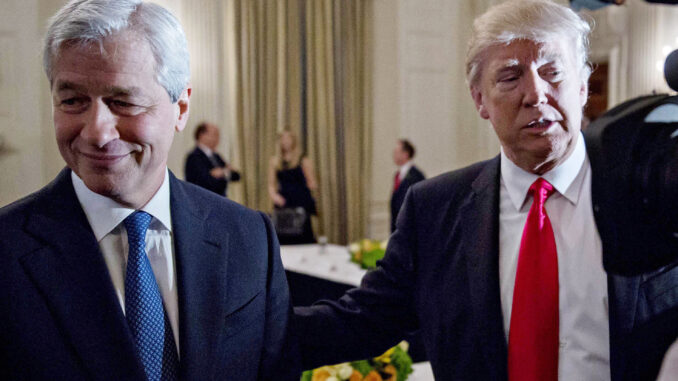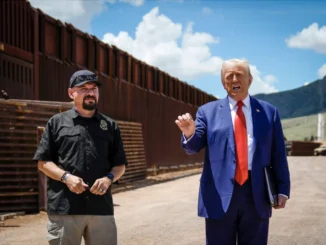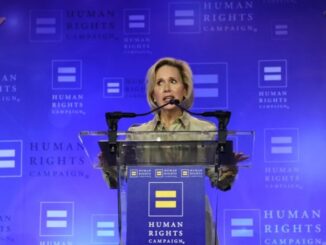
Trump Insists He Had No Idea His Truth Social Account Claimed Jamie Dimon Endorsed Him: ‘I Don’t Know Anything About It’**
In a recent twist of events, former President Donald Trump found himself embroiled in controversy surrounding his social media platform, Truth Social. The issue at hand? A post that claimed Jamie Dimon, the CEO of JPMorgan Chase, had endorsed Trump’s candidacy for the 2024 presidential election. This statement, which was widely circulated and reported, raised eyebrows and prompted a swift response from Trump, who insisted he was entirely unaware of the endorsement or the claim made on his account.
The Claim and Its Context
The alleged endorsement surfaced in a post that appeared on Truth Social, a platform Trump launched after being banned from several major social media sites in the wake of the January 6 Capitol riots. The post not only suggested that Dimon had thrown his support behind Trump but also implied a level of economic confidence in the former president’s leadership, given Dimon’s prominence in the financial world.
Jamie Dimon, as CEO of JPMorgan Chase, is not only one of the most influential figures in American banking but also a key player in the wider economic landscape. His endorsement—or lack thereof—could have significant implications for Trump’s campaign and, by extension, the perception of the financial community regarding Trump’s viability as a candidate.
However, when questioned about the post, Trump appeared to distance himself from the statement entirely. “I don’t know anything about it,” he stated emphatically during a press conference, suggesting that the content shared on his social media account was not something he personally vetted or approved. This response has led to speculation about the management of Truth Social and the degree of oversight Trump has over the platform.
The Reaction from Dimon and the Financial Sector
Following Trump’s insistence of ignorance, representatives from JPMorgan Chase were quick to clarify that Dimon had not endorsed Trump. The financial community, already wary of Trump’s unpredictable nature, reacted with skepticism and concern. Endorsements from high-profile figures in finance can shape public opinion and influence market dynamics; thus, the implications of a fabricated endorsement could have significant fallout.
In a statement, a JPMorgan spokesperson reiterated Dimon’s commitment to staying apolitical and focused on his role as a business leader. This response highlights the delicate balance financial leaders must maintain, particularly in a politically charged environment where their influence is often magnified.
The Implications for Trump’s Campaign
Trump’s denial of knowledge about the post raises questions about his campaign’s strategy and communication management. As he gears up for another run at the presidency, the stakes are higher than ever. The 2024 election landscape is expected to be fiercely competitive, with both Democratic and Republican candidates positioning themselves for a battle that could redefine American politics.
For Trump, the ability to secure endorsements from influential figures could provide a significant boost to his campaign, particularly among undecided voters who value economic stability and leadership. However, the chaos surrounding the claim of Dimon’s endorsement underscores the challenges he faces in managing his public image and the narrative that surrounds him.
A Pattern of Discrepancy
This incident is not isolated but fits into a broader pattern of Trump’s relationship with media and communication. Throughout his political career, Trump has often claimed ignorance regarding statements made in his name or attributed to him. Critics argue that this behavior reflects a lack of accountability and a tendency to distance himself from potentially damaging narratives.
Moreover, the role of social media in political campaigns cannot be understated. Platforms like Truth Social allow for rapid dissemination of information, but they also come with risks. Misinformation can spread like wildfire, and the consequences can be far-reaching. For Trump, who has been both a master of social media and a victim of its pitfalls, navigating this landscape will be critical as he seeks to solidify his base and attract new supporters.
The Future of Truth Social
The incident also raises questions about the future of Truth Social itself. As a platform, it was designed to be a space for Trump and his supporters to communicate freely, away from what they perceive as censorship from mainstream media. However, the platform’s credibility is at stake when false claims are made, especially regarding influential figures like Jamie Dimon.
Going forward, Trump and his team will need to enhance their oversight of the content shared on Truth Social. Clear communication and fact-checking will be essential to maintain trust among supporters and to present a unified front as the campaign progresses.
Conclusion
The fallout from the Jamie Dimon endorsement claim serves as a reminder of the complexities of modern political campaigning in an age dominated by social media. As Trump navigates the murky waters of his 2024 presidential bid, his insistence on ignorance regarding the claims made on his platform may not be enough to shield him from scrutiny. The importance of credibility and transparency in politics cannot be overstated, and as the election season heats up, Trump will need to adapt his strategies to ensure his message resonates without the distractions of misinformation and misunderstanding.
In a polarized political climate, every endorsement counts, and as the saying goes, perception often becomes reality. For Trump, the path ahead is fraught with challenges, but it is also ripe with opportunities—if he can manage to steer clear of controversy and focus on a cohesive message.


Be the first to comment